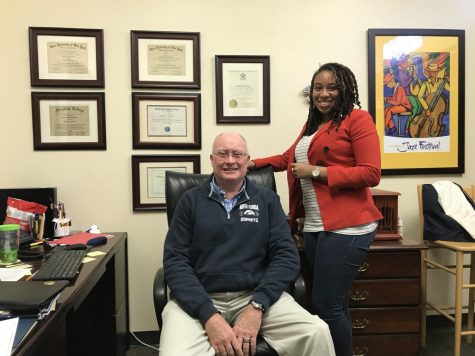UNF students are everywhere. We pass each other at the Town Center, downtown, at the beach, and at restaurants. Yet, the story behind how we got here differs for every person.
Dean of Students Thomas VanSchoor and Case Manager Charmaine Lowe explained how UNF faculty takes measures to help students from a homeless or foster care background receive an education. These students then go on to help shape the future of the world.
Around 2006 and 2009, the state legislature asked certain universities to create programs that would help homeless and foster care students get a college education, according to VanSchoor. Although UNF was not one of the universities selected, VanSchoor, who was the Student Ombudsman from 2002 to 2014, decided to start the programs here at UNF.
The chosen universities use tuition waivers, which cover the cost of tuition for these students. However, VanSchoor said, “If you are only giving them a tuition waiver, and they don’t have money to live, they really can’t go to school.”
In order to solve this problem, a financial aid package was introduced to cover the cost of needs like food, housing, books, clothes, toiletries, and more.
In the past, groups supported these students by bringing them supplies at the beginning of the year. VanSchoor said there is no longer any group support, but they do receive monetary support from individuals on the Student Affairs Committee. However, most of the cost is handled through the waiver and financial aid, according to VanSchoor.
To get into the program, the students go through normal admissions. Once they are accepted, Lowe said there is usually a case manager or independent living manager to help connect the students with the program, as well as help them get acclimated into the university.

According to VanSchoor, there are around 12 students that come from a homeless background, and around 40 students that come from a foster care background every year. He also mentioned there is no cap for how many homeless and foster care students are accepted and supported.
Lowe and VanSchoor explained that the end goal of the program is professional and personal success for the students. However, with every success, there are challenges to overcome. Lowe explained that getting through school is harder for homeless and foster care students because of barriers. These barriers could be social, economic, or personal.
In order to help them succeed, Lowe said they have to help the students overcome these barriers.
“I think one of the challenges with the homeless and foster care population is that there is a history of instability,” said Lowe.
VanSchoor said the students grew up without a stable adult role model who cares about their success, although every situation is different. He said a goal of the program is to provide a place where the students can come to feel personally supported.
“Proving that anchor to them at the university, where they can come and know that someone is going to care about them, makes a big difference,” VanSchoor said.
VanSchoor cited trust as a recurring issue with the students. In the past, these students have placed their trust in people who didn’t follow through or stick around.
Another challenge, according to Lowe, is some of the students fall off track from time to time. She said she sees students do really well one semester, and then not so well the next.
“They need to be educated on maintaining stability and changing perspectives, because of the history they have been through,” Lowe said.
VanSchoor said he takes the slogan “No one like you, no place like this,” seriously and strives to develop an individual plan for success for each of these students.
No matter where you come from or where you are going, support is usually beneficial in a climb towards success. When people have your back, like VanSchoor does for students from a homeless or foster care background, the impossible seems more possible and challenges are overcome.
—
For more information or news tips, or if you see an error in this story or have any compliments or concerns, contact editor@unfspinnaker.com.












